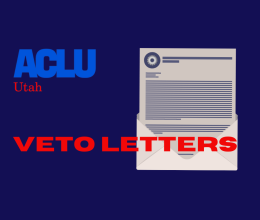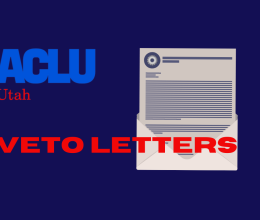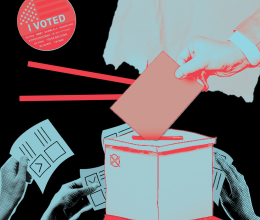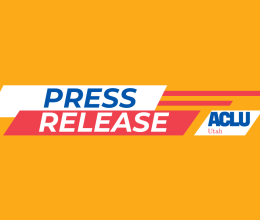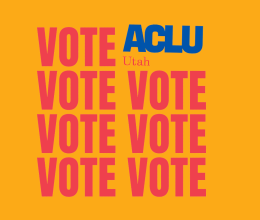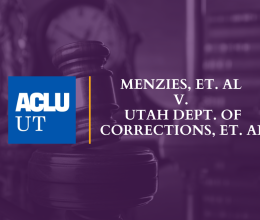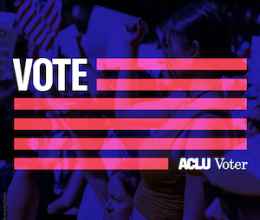
FOR IMMEDIATE RELEASE
October 11, 2018
In the wake of significant changes to voter registration deadlines and voting options approved earlier this year by the Utah legislature, the American Civil Liberties Union of Utah (ACLU of Utah) today expressed concerns on whether all county clerks are ready to implement these modifications.
Of particular concern is the questionable readiness by many county clerk offices to administer Election Day Registration (EDR). EDR is a major component of Utah’s newest voting law. It allows eligible but unregistered voters to register to vote and cast a provisional ballot on Election Day. Since this is the first year Utah voters can take advantage of EDR, the ACLU of Utah is working to ensure that all county clerk’s offices are prepared to implement this new voting option.
The ACLU of Utah’s concern about EDR readiness stems from a recent phone survey of clerk’s offices in eight Utah counties. The ACLU of Utah asked each office a series of questions to determine the office’s level of familiarity, public education, and preparedness for Election Day Registration (EDR) and other in-person voting options.
The survey results, as described below, are troubling. Therefore, the ACLU of Utah is calling upon the Lieutenant Governor and Utah State Elections Office to take the necessary steps in assuring that all counties have the correct information and resources they need to apply provisions in the law equally to all voters.
Although a majority of the clerk offices we surveyed claimed EDR information was posted on their websites, only two out of eight counties (25%) actually had the information posted online. Some county websites link to the state’s election website, but not to the webpages that refer to EDR. In addition, three out of eight offices could not confirm that EDR procedures were added to poll worker training this year even though these workers will be responsible for implementing this new voting option. The possibility that potential voters might be turned away from their local polling locations because of uninformed poll workers is of grave concern.
The survey also demonstrates that EDR readiness is correlated to how well the county is prepared overall for the upcoming election, especially with regard to in-person voting. For example, one county clerk’s office that lacked online information about EDR also continues to display the 2016 deadlines for returning mail-in ballots and the Election Day on its website. Another county clerk’s office repeated several times that vote-by-mail eliminated the need for EDR. This is despite the fact that unregistered but eligible voters—the target audience for EDR—will not receive a mail-in ballot. EDR also provides a fail-safe option for registered voters who don’t receive or lose their mail-in ballot, whose registry information is incorrect or out-of-date, or who find themselves otherwise removed from the voter rolls.
Based on these survey results, the ACLU of Utah believes county clerk offices could be better prepared for EDR and in-person voting this year. While some county clerk offices may improve their readiness by posting updated information about early voting and EDR online, other offices need to augment staff training, poll worker education, and logistics.
We recognize that all county clerk offices share a strong commitment to allow every eligible voter in Utah to cast a ballot this year. We also believe that the successful implementation of EDR in every county in Utah will make that goal achievable.
The ACLU of Utah has forwarded the results of our recent survey to the Lieutenant Governor’s office and the Utah State Elections Office. We urge both offices to take these findings seriously and to work with county clerks and their staffs to ensure that EDR has a smooth and successful debut, in all counties, on November 6.
Rep. Rebecca Chavez-Houck (D), sponsor of H.B. 218 Modifications to Election Law (2018)
“While campaigning door-to-door, I met many people who had recently moved to the district and missed the deadline to register to vote. Their lives were busy and complex, and our election system was failing them. I fought for Election Day Registration because I believedthere had to be a fail-safe for voters who thought they had done everything right, but for some reason or another were not registered to vote. Given Utah’s consistently low voter turnout, supporting Election Day Registration is simply the right thing to do.”
Brittney Nystrom, Executive Director, ACLU of Utah
“Voting is a fundamental right in our democracy and smart ideas like letting people register to vote on Election Day will reduce roadblocks to exercising that right. But these innovations will only work if they are supported by well-informed county clerks, trained poll workers, and with sound oversight from the state’s top election officials.”
Contacts for media interviews:
Rep. Rebecca Chavez-Houck
Sponsor of H.B. 218 (Modifications to Election Law)
[email protected]
801-891-9292 (c)
Contact: Jason Stevenson
Strategic Communications Manager, ACLU of Utah
[email protected]
(801) 871-0334 (w) or (617) 290-8188 (m)
# # #
